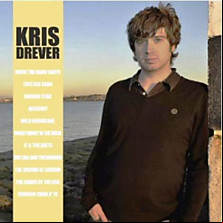BBC Review 1bj6o
Quite understated and beautifully played, Drever’s singing peerless throughout.
Jon Lusk 2010
Fresh from winning a BBC Radio 2 Folk Award for Best Group with his ‘day job’ band Lau, this Scottish singer, guitarist and occasional songwriter releases his second solo set.
After a debut as great as 2006’s Black Water almost anything would disappoint. But while Mark the Hard Earth doesn’t quite reach the heights of that record, it is still impressive, and has a strong, slow-growing charm.
Drever has assembled much the same team of players, with Roy Dodds (drums) Ewen Vernal (bass), Donald Shaw (keyboards) and guitarist Ian Carr serving him well, as does fiddler and producer John McCusker. Irish American multi-instrumentalist Tim O’Brien is the most distinctive new collaborator, adding the sonic equivalent of subtle marker pen highlights to many songs with his mandolin, banjo, ukulele and harmony vocals. Irish singer Heidi Talbot is the other novice, duetting with Drever on The Banks of the Nile, the most familiar piece on a selection which, as before, mixes old and new writing.
Of the latter, Drever has again chosen two songs by Edinburgh songwriter Sandy Wright. Both are sentimental waltzes, although neither is as distinctive as his contributions to Black Water. Boo Hewerdine’s country-gospel flavoured Sweet Honey in the Rock is, though, up to his usual high standard. Best of all is The Crown of London, by Drever’s brother Duncan, a pulsing number with a melody that simply bores into your brain and stays there, along with some great lyrics: “The devil’s made plans for the wealthy man / he’ll never get to me”.
The self-penned title-track is a stark, enigmatic waltz that’s the slowest grower of all, introducing a wintry theme that resurfaces several times. Of the more instantly accessible material, there’s the sprightly, countrified This Old Song, with its tricky tempo changes, and a lovely version of The Call and the Answer, which fans of The Dubliners may know.
Of the traditional pieces, the ballad O’ A’ the Airts has especially fine backing vocals by Talbot, and the closing Freedom Come A’ye matches words by the great Scottish poet Hamish Henderson with the tune of Bloody Fields of Flanders, to strikingly solemn effect.
It’s all quite understated and beautifully played, and any shortcomings in the material are more than made up for by Drever’s peerless singing. This is a very good – as opposed to great – record.



